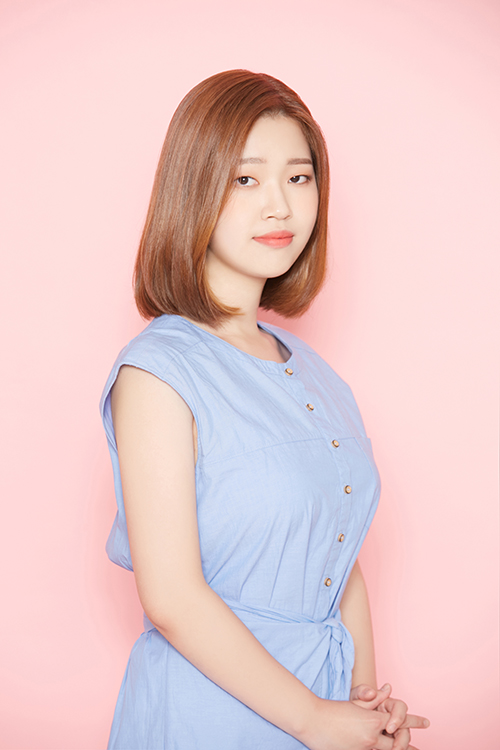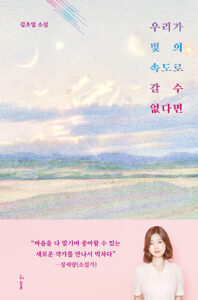Boundless imagination that soothes one’s solitude
2020.02.03
Curious title, warm and dreamy pastel-colored cover, and the future embedded inside. The short story collection “If We Cannot Move at the Speed of Light (Hubble)” by Kim Cho-Yeop has been a sensation since its publication. The author’s compassionate science fiction stories are based on understanding and empathy towards others.

Please briefly introduce yourself to the readers of <K-Book Trends>
Hello, I am Kim Cho-Yeop, the writer of the first short story collection “If We Cannot Move at the Speed of Light” published last year. Having majored in Chemistry, I am writing science fiction stories. It is my pleasure to be meeting readers through <K-Book Trends>. I hope you can all enjoy encountering new and fine works in 2020 too.
Your work “If We Cannot Move at the Speed of Light” has been passionately embraced by readers since its publication last year. What do you think the reason is?
I believe that everyone has an earnest desire to imagine another world. My book “If We Cannot Move at the Speed of Light” is a short story novel collection that depicts another world. The stories adventure through the universe, Deep Ocean, utopia, and dystopia, stimulating the imagination inside people’s hearts. Also, I think my work has a relatively low entry barrier for an SF story. I enjoy adding scientific details into my novel, but I try to write a novel that anyone, even those that do not love science, can find interesting.
Science fiction is not a popular genre in Korea. I wonder what the motivation and process were for you to decide to start writing in that genre.
I liked writing since I was young, and I also wrote a non-fiction story on science when I was majoring in science. But I thought that a novel was something for a few talented writers. Then after graduating from college, I came across a line in a book about writing techniques for novels that “novel writing does not require a special talent but is trainable.” I began writing rough drafts around then, and an SF contest was opened in my college. I submitted my work there to win the cash prize, but this became the momentum for writing SF stories.

Is there a writer or a work that particularly influenced you?
I was mainly influenced by Korean SF writers. The works of Kim Bo-Young and Jeong So-Yeon effectively combine science fiction and the stories of the marginalized. Ever since I began my career as a writer, I looked for works of foreign female SF writers; I was particularly impressed by the works of Octavia E. Butler.
I believe that science fiction can well deliver the fun of strolling and adventuring
in other worlds and the excitement of meeting and exploring other beings.
Interesting and creative ideas can be frequently found in your stories. For example, in the story “Book Missing Inside Library”, a mind-uploading technology that saves the data of the dead becomes possible, and in another story “Universal Nature of an Emotion”, people trade substances that provoke feelings. Also, in “Spectrum”, aliens look after humans that have a longer life span. How do you mainly come up with these ideas?
I try to read many science books and articles. I got the idea of mind-uploading technology in the story “Book Missing Inside Library” from a science magazine I was subscribing to which published a feature on it. As I found it interesting, I got to connect the idea with a phenomenon that I made a note of where “books go missing inside a library.” Also, I got the idea of aliens in “Spectrum” from the story of people with “supervisions” that I read from a book. This skill is also called tetrachromacy, where people have an extra type of cone cells that recognize more colors than ordinary people and see more various colors.
I want to write stories that are fun and easy, but also that can influence readers’ minds.
Is there anything you expect from the readers of your works?
First of all, I hope they can enjoy my novels. I believe that science fiction can well deliver the fun of strolling and adventuring in other worlds and the excitement of meeting and exploring other beings. To go an extra step, I hope that the empathy and understanding of various beings shown in science fiction leads to the understanding of other people in real life as well.
Is there a common topic or value that applies to all the stories?
It is difficult to define it, but I think it is “understanding others.” Science fiction is a good genre to be in another’s shoes. Humans that went to space and humans that were left alone on an alien planet experience isolation and solitude that can be easily neglected in real life. So with the fictional experience, I want to expand the scope of social imagination and empathy.
Please leave a message for readers and your future work plan.
I am planning to announce several short and long stories. I am plotting a story in which people get to live a life in a sort of an overlapped reality and virtual reality after society and humanity are “reset” in the near future. I want to write stories that are fun and easy, but also that can influence readers’ minds. Please look forward to it.
Written by Hwang Jin-Ah

